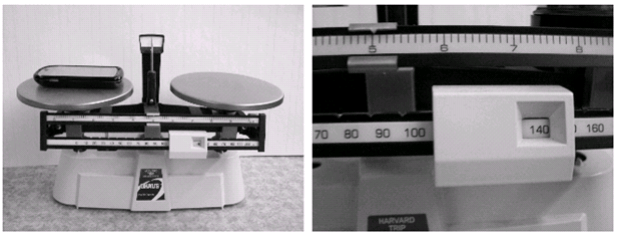A hypothesis must be testable. Which hypothesis is testable?
a. Blue is the best color.
b. Summer is nicer than fall.
c. Dogs are better than cats.
d. A beagle can jump higher than a Persian cat.
d. A beagle can jump higher than a Persian cat.
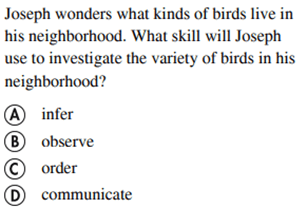
B Observe
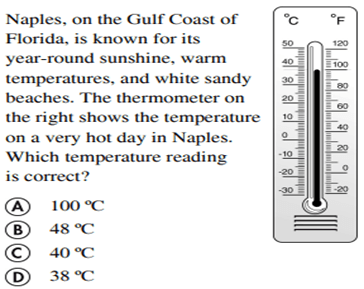
D. 38 degrees C
- You have two graduated cylinders that contain water. The water forms a curved surface called a meniscus in each graduated as shown below. What is the difference between the volumes of water in the two graduated cylinders?
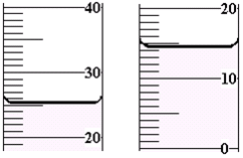
- 10 milliliters
- 15 milliliters
- 25 milliliters
- 40 milliliters
a. 10 milliliters
Your group is separating a mixture of salt, sand, and staples. What will happen if warm water is stirred into the mixture?
a. The salt will dissolve.
b. The sand will dissolve.
c. The staples will dissolve.
d. The mixture will not change
a. The salt will dissolve.
Micah placed a beaker of water on a hot plate. When bubbles started forming in the water, he made the first sketch. After
5 min, he made the second sketch.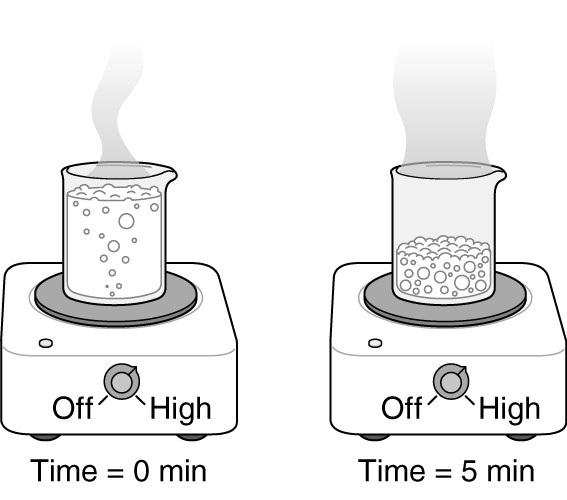
What happened during the 5 min that Micah was observing the beaker of water?
a. Water was changed into energy during a chemical change.
b. Water was changed into a different state during a physical change.
c. Water was changed into a different material during a physical change.
d. Water was changed into a different material during a chemical change.
b. Water was changed into a different state during a physical change.
Caleb is holding a metal block in his hand. What could he do to decrease the thermal energy of the block?
a. cool it
b. drop it
c. hit it
d. melt it
b. drop it
Which one of the questions below is a Testable Question?
a. What is gravity?
b. How many stars are in the sky?
c. Why does the Earth orbit the Sun?
d. What color candle burns the fastest?
d. What color candle burns the fastest?
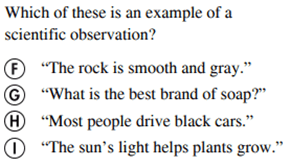
F. "The rock is smooth and gray."
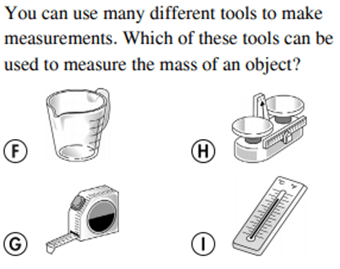
H. The Balance
Mr. Brown said his cell phone had a mass of 135 grams. Ms. Smith wondered what the mass of her cell phone was. She put it on the left pan of one of the double beam balances in her classroom. Then she moved the masses until the pointer was in the center. What is correct about the masses of the two cell phones?
a. The mass of Ms. Smith’s cell phone is 5 grams greater.
b. The mass of Ms. Smith’s cell phone is 10 grams greater.
c. The mass of Mr. Brown’s cell phone is 15 grams less.
d. Both of the cell phones have the same mass.
b. The mass of Ms. Smith’s cell phone is 10 grams greater.
The class is investigating the dissolving of several substances in water. One group decides to use a whole piece of hard candy and the same kind of candy crushed into small pieces. Which of the following is the BEST testable question for this group’s investigation?
a. Do substances dissolve faster when they are stirred?
b. How does the temperature of water affect how a substance dissolves?
c. Does the surface area of a substance affect how fast or slow it dissolves?
d. Why do some substances dissolve in water and some substances do not?
c. Does the surface area of a substance affect how fast or slow it dissolves?
The rails on a railroad track have small gaps between sections of metal rails. Why are these gaps needed?
a. They allow the metal to expand when it is heated without bending the rails.
b. They allow the metal to expand when it is cooled without bending the rails.
c. They keep the rails from touching and reacting with one another.
d. They help chemical reactions between the rails and air happen faster.
.
a. They allow the metal to expand when it is heated without bending the rails.
An object has a type of energy due to the movement of electrons. Which type of energy is it?
a. chemical
b. electrical
c. mechanical
d. thermal
b. electrical
What are meteorologists doing when they create storm tracks such as this one?
a. Predicting
b. Testing their ideas
c. Explaining how a hurricane develops
d. Gathering information to determine the strength of a hurricane ![]()
a. Predicting
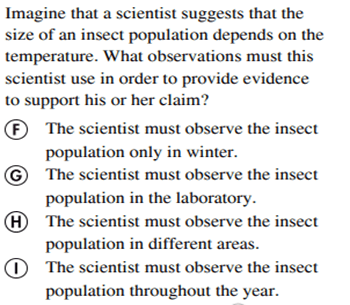
I. The scientist must observe the insect population throughout the year.
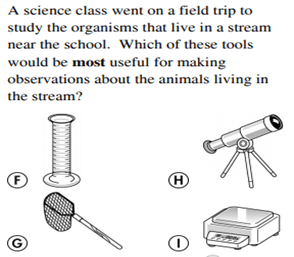
G. The NET
Three states of matter are solid, liquid, and gas. Think about liquids and gases. Which property do liquids and gases have in common?
a. Having no color
b. Taking a definite shape
c. Having a definite volume
d. Taking the shape of their container
d. Taking the shape of their container
Claire is studying how quickly sugar dissolves in warm and cold water. First, she dissolves a 4g sample of raw sugar, as shown in the following figure, in both warm and cold water. Then she dissolves a 4g sample of white sugar, as shown in the following figure, in both warm and cold water.
In which of the following solutions would the sugar dissolve the slowest?
a. Raw sugar, cold water
b. Raw sugar, warm water
c. White sugar, cold water
d. White sugar, warm water
a. Raw sugar, cold water
Wilson made a list of activities that involve a chemical change. Which of these changes should be included on his list?
a. ringing a bell
b. making ice cubes
c. picking up rocks
d. making pancakes
d. making pancakes
Chemical energy can be used to produce kinetic energy. Which activity is an example of using chemical energy to produce kinetic energy?
a. flying a kite
b. using gasoline to run an engine
c. using a magnet to pick up a steel nail
d. turning on a light switch
b. using gasoline to run an engine
Researchers at Florida International University surveyed people to find out how many would not evacuate if a hurricane were approaching. In 1992, 18% would not evacuate. In 1999, 46% said they would not evacuate. How can scientists use this information?
a. To predict where people go when they evacuate
b. To explain why people choose not to evacuate
c. To predict how many people will not evacuate
d. To predict which route people will use to evacuate
c. To predict how many people will not evacuate

A to learn from each other

F. hand lens
The class investigated the temperature of water in each of its three states. They measured the temperatures of crushed ice, room temperature water, and water vapor from a cup of hot water. Which of the following statements BEST describes what the class observed?
a. Solid water is warmer than liquid water.
b. Water vapor is colder than liquid water.
c. Liquid water is the same temperature as water vapor.
d. Solid water is colder than water vapor and liquid water.
d. Solid water is colder than water vapor and liquid water.
Mrs. Lopez is a chemist who is studying salt crystals. She wants to slow the rate at which the crystals dissolve in a solution of water. What could she do to slow the dissolving rate?
a. Crush the salt.
b. Heat the solution
c. Cool the solution
d. Stir the solution
c. Cool the solution
Jo made a list of chemical changes and physical changes.
Chemical changes: Burning leaves, toasting a bagel, baking a loaf of bread, crumpling aluminum foil into a ball
Physical changes: Tearing paper, sharpening a pencil, pouring milk into a glass, freezing water into ice cubes
Which is in the wrong list?
a. sharpening a pencil
b. baking a loaf of bread
c. pouring milk into a glass
d. crumpling aluminum foil into a ball
d. crumpling aluminum foil into a ball
Jacob has a thermometer that is at room temperature. He places it in the glass shown here. Which reasoning supports the claim about what will happen to the liquid in the thermometer?
a. An increase in thermal energy will cause the liquid to expand.
b. An increase in thermal energy will cause the liquid to contract.
c. A decrease in thermal energy will cause the liquid to expand.
d. A decrease in thermal energy will cause the liquid to contract.
d. A decrease in thermal energy will cause the liquid to contract.
Alexander has a new type of liquid fertilizer for his house plants. He wonders what solution of fertilizer and water will make his plants grow the tallest? What is the best way to investigate the question?
a. look in his gardening books
b. interview the local nursery owner
c. take a survey of people coming out of the nursery
d. do an experiment with different amounts of fertilizer solutions
d. do an experiment with different amounts of fertilizer solutions
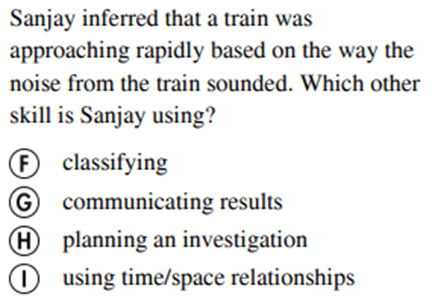
I. using time/space relationships
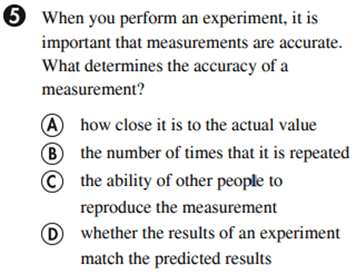
A. how close it is to the actual value
Gene is sitting in the kitchen as her dad makes dinner. She is looking for examples of solids, liquids and gases. Which of the following is the best example of the property of gases?
a. Boiling spaghetti makes it soft instead of brittle.
b. Freezing water makes ice cubes.
c. Heating butter changes its shape and state.
d. Cooking odors spread out to fill the kitchen.
d. Cooking odors spread out to fill the kitchen.
Nadia has a mixture of oil and water. She wants to separate the mixture. How can she do this?
a. By using a magnet to attract the oil
b. By pouring the mixture through a sieve
c. By evaporating the water from the mixture
d. By letting the oil float to the top and skimming it off
d. By letting the oil float to the top and skimming it off
Which of the following represents a physical change?
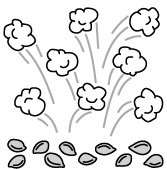
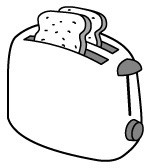
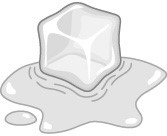

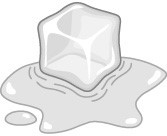
The water in a swimming pool tends to be warmer in the daytime and cooler at night. What natural source of energy causes this temperature difference?
a. chemical energy
b. sound energy
c. mechanical energy
d. solar energy
d. solar energy
Jane is investigating to find out if bean plants grow taller in ordinary topsoil or special potting soil over a three week period. She sets up her investigation with 10 bean plants of equal size in each type of soil.
What should Jane do each day to make sure she gets valid results?
A. Water only the plants in special potting soil.
B. Calculate the average plant height for each soil type.
C. Move the plants in ordinary topsoil to different locations.
D. Estimate the height of each plant's stem and record the estimate.
B. Calculate the average plant height for each soil type.
In order for an experiment to be validated it needs to be performed by others, having someone else do your experiment is called?
REPLICATION
Liquid and mL
What are the 3 states of matter?
Solid, liquid and a gas
Natasha set up two identical solar cookers. After 25 minutes, she recorded the temperatures shown below.
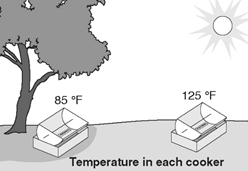
Based on the evidence in the picture, what claim can Natasha make?
a. A solar cooker cannot cook food safely.
b. A solar cooker does not heat up as quickly in the shade.
c. Different kinds of food cook at different times in a solar cooker.
d. It takes longer than 15 minutes to heat something
b. A solar cooker does not heat up as quickly in the shade.
2) Sonya wanted to know if mowing affects the health of grass during a drought. To find out, she collected data on how often her neighbors mowed their grass. Based on the information she collected, what is the BEST next step?
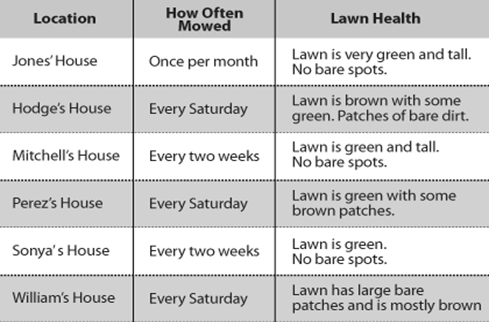
A. Report her findings to her neighbors.
B. Develop a plan to save everyone's lawns.
C. Stop her neighbors from mowing their lawns.
D. Find out if other things might be affecting the grass.
D. Find out if other things might be affecting the grass.
Scientists need to use their ______ to make observations
What are the 5 senses?
Scientists use what tool to measure length and what is the unit of measurement?
meter stick, and the unit of measurement is meters, cm, and mm.
Thomas and Julie wanted to find out which material would insulate their teacher's coffee cup and keep the coffee hot for the longest period of time. They first wrapped her cup with bubble wrap and recorded the temperature of the coffee once every 15 minutes for 2 hours. They repeated the investigation, this time using newspaper instead of bubble wrap, but they got the same results for both materials.
What could they do to make sure their results are valid?
A. Repeat their experiment.
B. Use tea instead of coffee.
C. Use a different thermometer.
D. Conduct their investigation in a colder room.
A. Repeat their experiment.
Scientists use a balance to measure __________, and the unit of measurement is represented by
Brianna's class wants to determine if boys or girls recycled more paper each day. They set up separate recycling bins in the classroom and labeled them "Boys" and "Girls." The students then placed their paper items in the right bins.
Which of the following should the students do each day before emptying the bins?
A. Make lists of the different types of paper in each bin.
B. Count and record the number of paper items recycled in each bin.
C. Make a list of which student recycled which paper item in each of the bins.
D. Record their estimate of the number of times students placed items in each bin.
B. Count and record the number of paper items recycled in each bin.
Kevin wanted to find out which of his toy cars, the Corvette or the Mustang, would roll downhill faster. He made a ramp by putting several books under one end of a board so that the board was slanted. Which would be the best way for him to perform his experiment?
A. Roll each car down the ramp separately five times and estimate which car looked faster.
B. Roll both cars down the ramp together one time and see which one gets to the bottom first.
C. Roll each car down the ramp separately one time, and time them with the second hand on his watch.
D. Roll both cars down the ramp together five times and record which gets to the bottom first each time.
D. Roll both cars down the ramp together five times and record which gets to the bottom first each time.
Jonathan and Sarah have performed an experiment and are not sure their results are valid. What should they do to check their results?
A. average their data
B. change their lab report
C. perform a new experiment
D. repeat the same experiment
D. repeat the same experiment
During a recent drought, Sonya noticed some yards in her neighborhood were healthy and green, and some were mostly brown and dead. Sonya believes the difference has to do with how often her neighbors mow their grass. What should Sonya do first to find out if she is right?
A. Ask her neighbors to cut their grass on the same schedule.
B. Study other neighborhoods to see if there are similar problems.
C. Compare the neighbors' lawn mowers to see if there are similarities.
D. Survey her neighbors about their mowing schedule and record the details.
D. Survey her neighbors about their mowing schedule and record the details.
Jordan wants to find out if a hamster can learn a maze as quickly as a mouse can. She has researched mice and hamsters and predicts which rodent she thinks will learn more quickly. What should her next step be?
A. analyze hamster behavior in the maze
B. research how a rabbit would behave in a maze
C. observe the behavior of both rodents in the maze
D. make conclusions about rodent behavior in the maze
C. observe the behavior of both rodents in the maze
Stephen and his classmates are going on a field trip to a nature preserve. His teacher has told the class that when they return to school, they will be required to give a report on their trip and the animals and plants they saw while walking through the preserve.
What is the BEST method Stephen can use to make sure he remembers everything he sees?
A. He should bring a pad and pen to write down his observations.
B. He should do research on the computer when he returns to class.
C. He should ask his classmates to help him remember what he saw.
D. He should look for a map of the nature preserve at the visitors' center.
A. He should bring a pad and pen to write down his observations.
The students in Miss Smith's class were using catapults to launch small and large marshmallows across the room. The table below shows the distances in centimeters (cm) that the marshmallows traveled. Which of the following statements best describes the students' data?
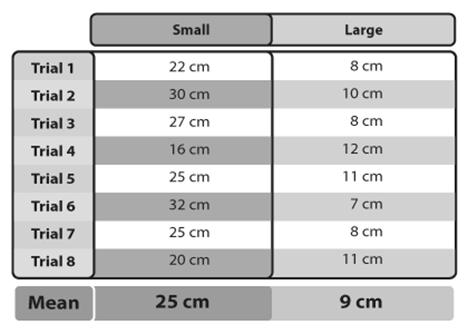
A. Small marshmallows travel an average of 9 centimeters.
B. Large marshmallows travel an average of more than 20 centimeters.
C. On average, small marshmallows travel farther than large marshmallows.
D. On average, large marshmallows go higher in the air than small marshmallows.
C. On average, small marshmallows travel farther than large marshmallows.
